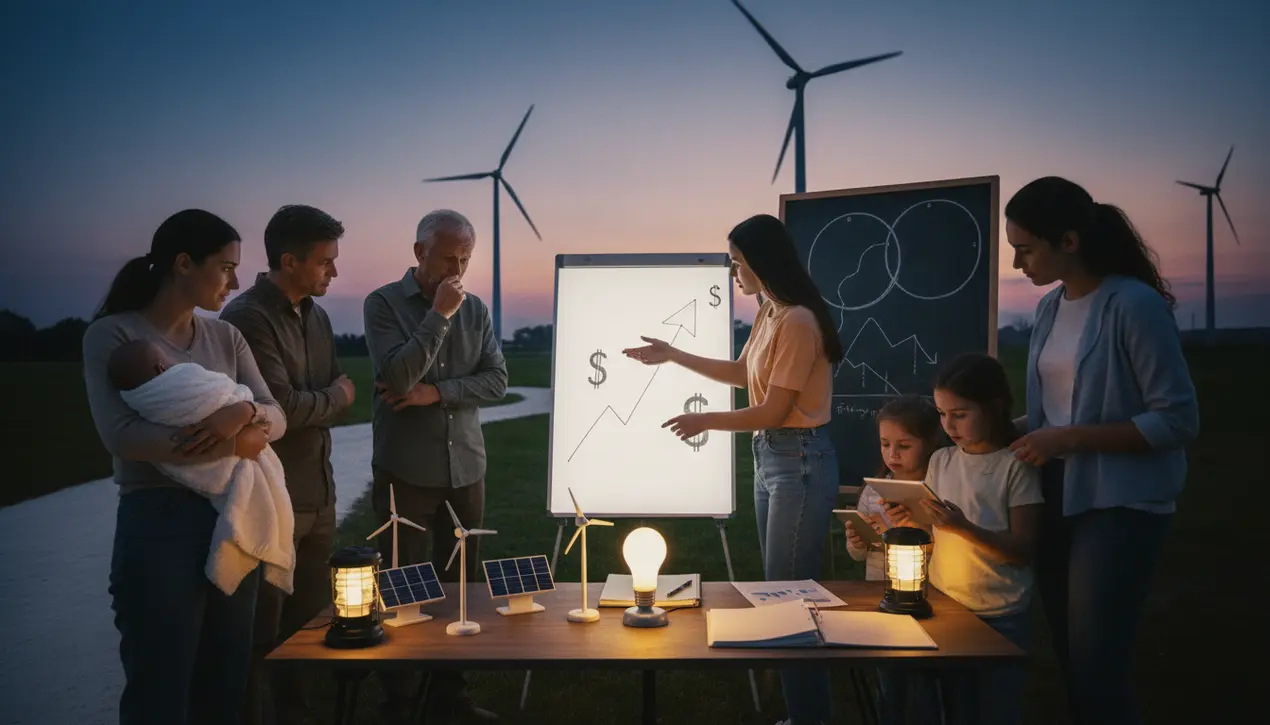
Scienceclimate scienceRenewable Energy Research
How to talk about clean energy in a cost-of-living crisis.
RA
Rachel Adams
4 hours ago7 min read
As electric bills continue their relentless climb, creating genuine household distress during this prolonged cost-of-living crisis, political figures like Donald Trump have attempted to pin the blame squarely on the transition to clean energy. This narrative, however, is crumbling under the weight of empirical evidence and shifting public perception.New research from the nonprofit Potential Energy Coalition delivers a compelling counter-narrative: the public isn't buying the scapegoating, and clean energy is poised to decisively win the affordability argument. This isn't merely an economic discussion; it's an ecological imperative intertwined with social justice, reminiscent of the early battles for environmental regulations where corporate interests often obscured the truth for profit.The Coalition's extensive survey of over 15,000 Americans reveals a landscape ripe for change. A significant 38% of respondents already correctly identify clean energy as the cheaper power source, while another 15% perceive cost parity.Crucially, fewer than a third cling to the outdated belief that fossil fuels hold a cost advantage. When asked to pinpoint the cause of soaring energy bills, a mere 2% mentioned clean energy; the overwhelming majority identified corporate greed and political maneuvering as the true culprits, followed by broader inflationary pressures and extreme weather events—the latter itself a symptom of our fossil fuel dependency.Will Howard, the head of insights at Potential Energy Coalition, argues that retreating from energy conversations amid financial anxiety is a strategic misstep. 'Cost-of-living concerns are viewed by many elites as an obstacle to talking about clean energy—as a reason to run away or change the topic,' Howard notes, his perspective echoing the frustrations of many climate advocates who see public concern as a lever for change, not a barrier.'But the reality is, shying away from the topic is the last thing we should do. Plenty of people already see the cost benefits of clean energy—and with the right message, many more do, too.' Their research substantiates this, showing that a message focusing on rising energy demand and the affordability of clean sources boosted the perception of clean energy's cost-advantage by a remarkable 27 points. This malleability in public understanding is key; it indicates a populace not firmly entrenched in misinformation but rather open to factual correction.The study also tackles the contentious issue of climate messaging head-on. In the wake of Trump's political resurgence, a palpable retreat from climate rhetoric has occurred, with some advocates and startups pivoting to frames like national security.A report from the Searchlight Institute even went so far as to suggest 'don't say climate change' as a primary rule for progress. Yet, the Coalition's data presents a different reality: messages centered on the urgent, tangible consequences of climate change proved equally, and sometimes more, effective at persuading people to support a transition to clean energy and take action.This suggests that abandoning the core environmental motivation is unnecessary and potentially counterproductive, severing the emotional connection many feel to the planet's health. Howard emphasizes that the most effective strategy is to weave together multiple resonant attributes.Clean energy must be positioned not as a novel, risky experiment but as a local, unlimited, and—critically—proven technology. The mistake of framing solar and wind as 'innovative' carries a hidden price tag of perceived risk and unproven reliability.'There's a price tag that comes with being new, and it's [also] the opposite of proven,' Howard explains. 'What we saw in the testing is that being proven—we've been trying to do solar for 50 years or more—and the fact that prices have come down so much over the last 25 years.is actually much more reassuring. ' Another psychological hurdle is the upfront cost of new infrastructure, which can cause public hesitation.However, this thinking often relies on a false binary choice between building renewables or maintaining the status quo. The reality, driven by a surge in power demand from data centers, electrification of transport, and industrial growth, is that we are building new capacity regardless.The true choice is between investing in renewable systems with known, declining costs or locking in more fossil fuel plants with volatile, perpetually increasing fuel expenses. Howard frames it as a necessary paradigm shift: 'The first step is getting them out of that binary and leveling the playing field.we have to build something. So what should we build?' Ultimately, the Potential Energy Coalition, founded by a former marketing executive, views clean energy through a branding lens—not as a corporate logo, but as a collective public understanding.This 'clean energy brand' is surprisingly robust and can be strengthened further through disciplined communication that highlights its core strengths: it is the cheaper, better choice because it is local, limitless, and proven. This research provides a vital roadmap for communicators, demonstrating that in a time of economic strain, the solution is not to silence the call for a cleaner world but to amplify the powerful, pragmatic truth that a sustainable future is also the most affordable one, a lesson we must learn before the window for meaningful action on our overheating planet closes for good.
#clean energy
#climate change
#cost-of-living
#messaging
#public perception
#featured
Stay Informed. Act Smarter.
Get weekly highlights, major headlines, and expert insights — then put your knowledge to work in our live prediction markets.
Comments
Loading comments...
© 2025 Outpoll Service LTD. All rights reserved.